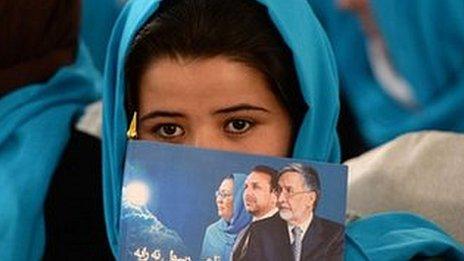Afghan notebook: First timers
- Published
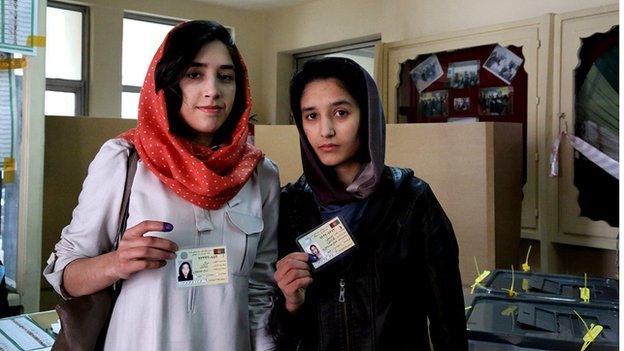
Young and first time voters boosted turnout in the presidential poll
One of the hallmarks of the Afghan presidential election has been the prominent role of young voters and activists.
First-time voters boosted turnout when ballots were cast earlier this month and many young people acted as election observers.
To capture what matters to first-time voters, the BBC organised a TV debate with more than 50 young Afghans in the Kabul studios of its partner station, 1TV. BBC Persian TV's Najieh Ghulami was co-host.
Things happen quickly in Afghanistan with little experience, lots of enthusiasm and hardly any time for rehearsal.
It applies to everything from television shows to elections, and BBC Persian's first-time voters' debate was no exception.
Most of our participants were not just voting for the first time. It was also their first time on television.
Our debate saw four young supporters of leading candidates giving a one-minute pitch about why their man should win, before facing surprisingly tough questions from the audience.
What did the candidates have to offer to young people, was the first question.
Afghan notebook: First timers
Political science student and keen tennis player Muslim Sadat was speaking on behalf of Abdullah Abdullah. He said his candidate would create a million new jobs, reform education and open libraries across the country.
"That's all very nice," an audience member shot back. "But where's the guarantee he'll deliver?"
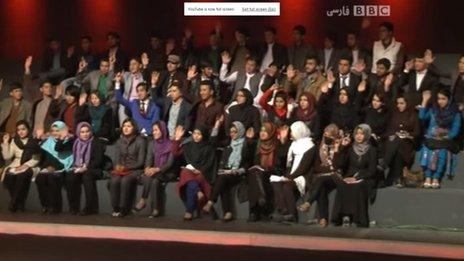
Jobs, education, women's rights and Islam were among the topics raised by the young studio audience
Sound bites
Afghanistan's deep ethnic divisions were another talking point.
Abdul Razaq Bashardost, a politics student and volleyball player, who was supporting Ashraf Ghani, said citizenship, not ethnicity was the most important thing now.
"Today's rivals are tomorrow's partners," he said, demonstrating a mastery of the sound bite well beyond his years. "We need to form a national team."
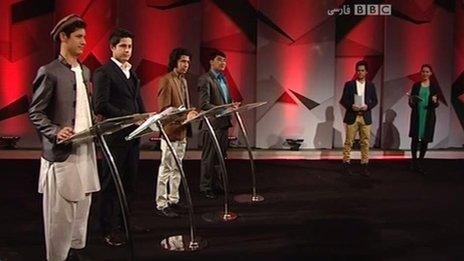
Four young supporters of different candidates faced an audience of 50 in the first-time voter debate
"I support someone who is guided by the light of Islam," said 18-year old Hashmatullah, an Islamic studies student and wrestling fan, who was speaking on behalf of Hezb-e Islami's Qutbuddin Helala.
"We're talking about presidential elections here," said a young woman in a red headscarf. "The candidates should have other things to say to us apart from Islamic law."
But another man disagreed: "Islam is involved in every aspect of our lives, including elections."
The next question came from a young woman who wanted to know what the candidates would do to improve women's rights.
Violinist and politics student Ali Parsa, speaking on behalf of Zalmay Rassoul, pointed out that his candidate was the only one to have a female running mate.
But two young women wanted assurances she wouldn't be just a symbolic presence.
"Habiba Sorobi has served as a Bamiyan provincial governor for eight years," Ali said. "There's no way she'll be a symbolic presence. We've promised that half the seats in our cabinet will go to women and younger people."
Hasmatullah, speaking for the conservative candidate Qutbiddin Helala, was more cautious.
"Mr Helala will give women all the rights that Islam has promised them," he said. "But they should respect their hejab."
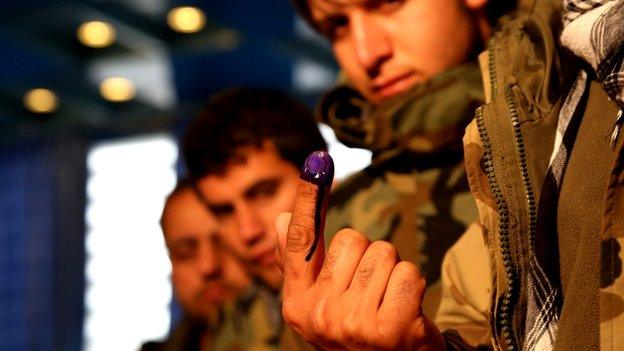
Young voters joined a social media campaign, posting pictures of their inked fingers to underline their voting rights
The final question came from a young student who wanted to know why some of the candidates had people on their teams accused of violent acts in the past.
"How can they be trusted to rebuild the future?" he asked.
Muslim Sadat spoke for Dr Abdullah, who is closely associated with the mujahideen force which battled to take Kabul in the early 1990s.
"The people in our team were not involved in any crimes in the past," he said. "The Taliban is the real threat here and Dr Abdullah has proved he can get rid of them."
Abdul Razaq defended Ashraf Ghani, who has controversial veteran Uzbek strongman Abdurashid Dostum on his ticket.
"Ashraf Ghani was the first to support solidarity and he was actively involved in writing the new constitution," he said. "Gen Dostum was involved in fighting our enemies and ensuring security."
Hope for change
Three of the four panellists said that their candidates were committed to signing a long delayed security pact with the US, statements which drew loud applause.
Only Hashmutalla disagreed: "The Americans should leave Afghanistan without any pre-conditions," he said. "We should not sign an agreement with them."
But Muslim shot back: "We need to sign the deal with the Americans," he said. "Look what happened in Iraq. How can we pay the army and run the government without foreign aid and assistance."
At the end of the debate we asked the audience if they thought this election had the power to change their lives. All but two people raised their hands to say that it did.
Listening to the debate I felt I was witnessing the beginnings of real change in my country.
Although these young people sometimes had profoundly different views and there were strong arguments from all sides, there was also a new sense of reality and tolerance.
- Published7 July 2014
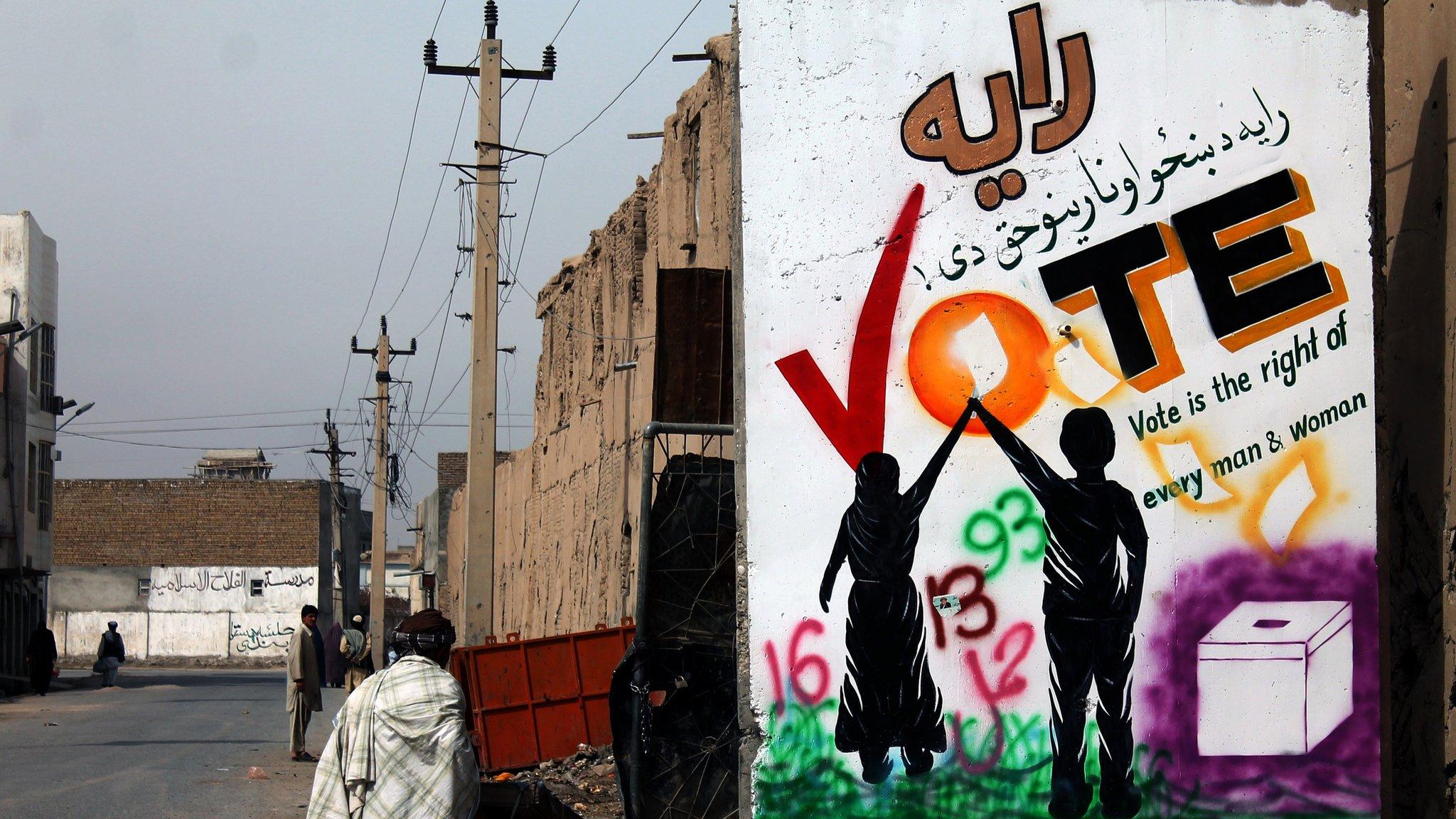
- Published9 April 2014
.jpg)
- Published18 March 2014
